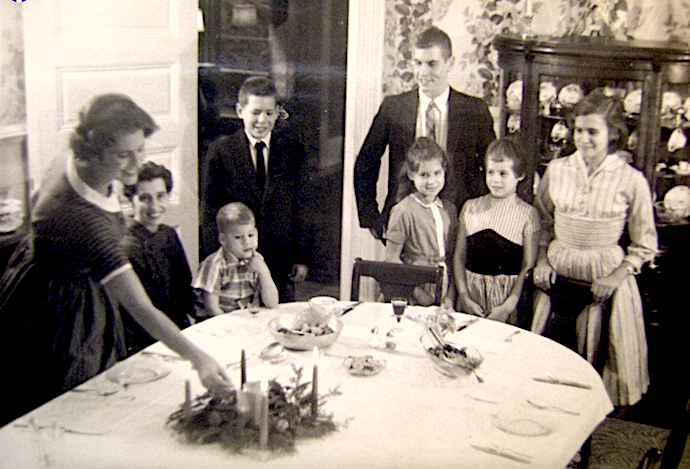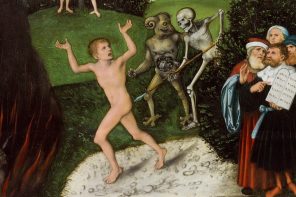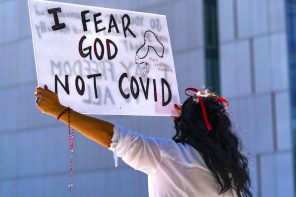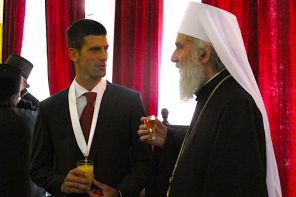Last week, researchers at Wellesley College and the University of Maryland described how—in contrast to the “Covid baby boom” that many joked would result from lockdown—the opposite is happening. There’s a coming baby bust. In fact, according to researchers at the Guttmacher Institute, 34% of women in the U.S. have chosen to have fewer children or delay getting pregnant altogether.
Welcome to the club!, I thought. Have you considered going all the way?
I don’t know exactly when I stopped wanting children. When I was young, I took it for granted that I’d have a big family someday. My grandmother had seven children and my mother had five. It was a Roman Catholic tradition, but also, just a happy fact of life—I and all of my friends grew up in big families, and planned to have big families when we grew up, too. Like Grammy, I would hold holiday dinners around a long oval table, with the special lace tablecloth, the wedding china, and the good silver, and candles glowing up and down the meridian.
In fact, when I was ten years old, I drew up a chart of all of the children I would have. There were seven girls and three boys. The columns included: “Job-to-Be,” “Hair Color,” “Hair Type,” and “Eye Color.” I even drew their pictures on index cards (though curiously, I only made portraits of the girls). Etheria Latifah had straight black hair and violet eyes, and worked as a cosmologist. Ilúvatar Mia was a professional swimmer with a blonde bob. Elbereth Ajenta was a dancer with green eyes. They were all spaced one year apart.
My older sister looked over it with amused appreciation, and asked, “How will you control what they’ll be?”
I didn’t have an answer for her. But I thought of that when, twenty-two years later, I was pounding the wall of my gynecologist’s office with the heel of my palm under fluorescent lights as she held me open and slid an IUD up through my cervix.
She’d showed it to me before she put it in: a tiny copper cross.
My salvation.
After the appointment, I drove home crying, but couldn’t say why. This was exactly what I’d wanted. I felt the IUD smoldering inside me like a live coal, neither good nor bad, just hot. It seemed to say, What a thing you’ve done, to divert biology to your will! Who do you think you are?
Well, I answered, I think I’m a human being who wants to do what I love.
By thirty, I’d found that marriage seemed like a bill of goods—an institution that made no sense for how I lived. I liked small children for a few hours at a time, after which I was glad to leave them, because they are effectively narcissistic sociopaths. I was a former scientist, now a novelist and playwright, who traveled as often as I saved enough money to do so. I had many lovers, who also had many lovers. I had an immense community of friends. I couldn’t see how I could be any happier than I already was. I still can’t. And in conversations with friends of all genders, over coffee in Durham, tea in Tehran, or sundowners in Palawan, all over the world, I find they feel the same way.
I recently rediscovered the chart I made when I was ten. My children include Tinúviel the mathematician, Éowyn the marine biologist, and Queloca the artist. Besides the obvious love for names from the fantasy literature I read growing up, it’s clear to me now that I was making a list of all the lives I wanted. And I can see them in the life I’ve lived so far: studying at MIT, interning at NASA, working a research vessel in the Atlantic, and then leaving it all behind to become a writer.
Shortly after getting my IUD, I made a new chart, this one of all the places I wanted to go. There’s only one column, labeled “Destination.” It includes Vietnam, Peru, Jordan, Sri Lanka, Cuba, and Ireland. My life doesn’t feel long enough to possibly go to all the places I want to go. My body doesn’t even feel big enough to hold all of the longings I feel. I’m confused when people ask me whether I’m lonely. I already feel like a small country.
I do admit—especially as I turn 40 this summer—sometimes I still feel haunted by the nature of the choice that was presented to me. If I had ever wanted a child, and knew that, in doing so, the state would help in raising one—provide paid leave and childcare like so many other nations do, protect me from pregnancy discrimination at work, and in general assume any of the workload that women are expected to bear alone or nearly so—maybe my answer would be different.
But none of this is the case. The state effectively discourages women from having children at all, a fact cast in even sharper relief as mothers have disproportionately suffered during the pandemic. If the “choice” to have children is a choice between doing what I love, and giving up everything I cherish about my life for certain poverty and the wreckage of my mental health, has it ever really been a choice at all?
Mindfully choosing not to have children is a radical act, not only in the U.S. context, but in a spiritual one. Of all of my mothers and grandmothers and great-great-grandmothers back to our ancestral Eve, I’ll be the first not to bear children. “Family” means something different now—not just my own blood, but a larger communion of the self in the world. I write every morning in my kitchen, stirring my coffee with one of Grammy’s spoons. I’ll never use it in a grand candlelit dinner with my children and their children. It’s for everyday use.
I am the end of my line.
But also, the beginning of another kind.





